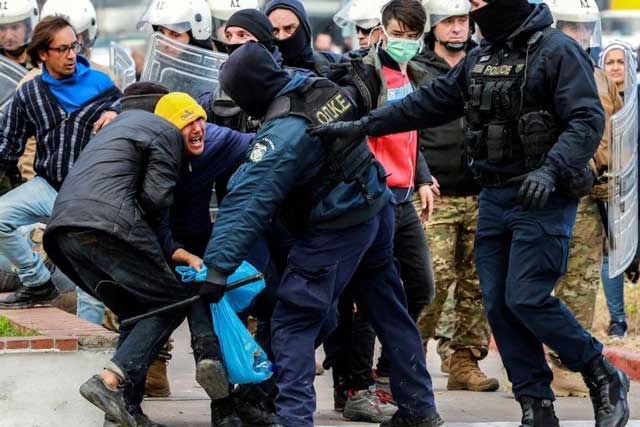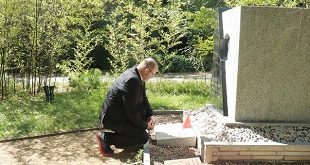
Athens, Greece | AFP | Facing overwhelming migration pressure on the Aegean with island camps on the brink of asphyxiation, the conservative Greek government has hardened its asylum policy with increased repatriations, new detention centres and plans for a sea barrier.
“The decongestion of our islands is our number one priority,” migration minister Notis Mitarachi told AFP as the government seeks to mollify islanders on the EU’s southeastern flank outraged by the perceived inaction in Brussels.
Five years after the great migration crisis of 2015, Greece is again the first gateway for migrants to Europe and struggling to manage a huge load of asylum applications.
Almost 90,000 are still pending among 112,000 exiles, according to the latest official figures.
On the Aegean islands of Lesbos, Samos, Chios, Leros and Kos, migrants continue to flock daily from neighbouring Turkey.
More than 38,000 people live in overcrowded and unsanitary camps that were originally built to handle just 6,200.
Slum-like tents and shelters grow like mushrooms around these sites, causing exasperation tinged with xenophobia among locals.
“It is essential to transfer as many asylum seekers as possible to the mainland where they can continue to pursue their asylum procedures,” the representative of the UN High Commissioner for refugees, Philippe Leclerc, told AFP this week.
The government had promised to transfer 20,000 asylum seekers until the end of 2019, but fewer than half have been relocated so far amid opposition from local residents and officials on the mainland as well.
– Back to Turkey –
Now the government, which in January was forced to reverse a July decision to abolish the migration ministry, is stepping up efforts to send asylum-seekers whose applications are rejected back to Turkey.
“The return process will be sped up,” Mitarachi said.
To achieve this, the Greek asylum service must deliver faster verdicts under controversial new legislation which came into force in January.
“I think it would be reasonable to deal with (asylum application) cases in three months,” the migration minister said.
Priority will be given to recently-arrived applicants, affording a maximum 25 days to evaluate the request and up to 60 days in the event of an appeal, before rejected applicants are led back to the border with Turkey.
In addition, Greece will only grant asylum for a maximum three years and the measure is subject to reevaluation depending on conditions in the country of origin, Mitarachi has said.
And to further discourage exiles from crossing the Aegean Sea, the government plans to install a floating barrier 2.7 kilometres (1.7 miles) long and 1.10 metres (3.6 feet) high in the Aegean.
The controversial project has elicited the wrath of non-governmental organisations.
Human Rights Watch says the barrier “makes no sense and is potentially life-threatening” to the flimsy dinghies into which people smugglers usually pack migrants.
Amnesty International similarly said the idea “raises serious issues about rescuers’ ability to continue providing life-saving assistance to people attempting the dangerous sea crossing”.
The government is also compiling a register for humanitarian organisations authorised to assist with migrant rescue, after state officials claimed that some groups had operated like “leeches” drawing on EU emergency funds on migration.
– ‘Prison camps’ –
The government of Prime Minister Kyriakos Mitsotakis had hoped to appease the anger of the islanders by vowing to close the sordid camps of Moria on Lesbos, Vathy on Samos and Vial on Chios, replacing them with new closed centres by the summer.
In Leros and Kos, the existing camps will be enlarged.
But elected officials and residents demand the immediate removal of asylum-seekers, fearing that the new centres will be prison camps in all but name.
“If we accept a (new) camp for 7,000 people, unofficially it could be 20-25,000 people,” Georgios Stantzos, the mayor of eastern Samos, said this week during a protest by islanders in Athens.
The capacity of the five new camps will be for 20,000 people.
And the migration ministry has warned that improper behaviour inside the camps will count against a person’s asylum application.
The project has also attracted criticism from NGOs who see it as a violation of international asylum law.
“Applying for asylum is not a crime even if you cross a border irregularly. We ask… that detention be the absolute exception,” said Leclerc of the UNHCR.
 The Independent Uganda: You get the Truth we Pay the Price
The Independent Uganda: You get the Truth we Pay the Price



